Feed aggregator
BFFT Spotlight on Spacebear Sparx
MOOBARKFLUFF! Click here to send us a comment or message about the show!
Taebyn and I chat with Spacebear Sparx the founder and host of Straight From the Muzzle Podcast! Although Taebyn had some technical issues with resulted in some very funny moments! Join us for an unedited chat!
Thanks to all our listeners and to our staff: Bearly Normal, Rayne Raccoon, Taebyn, Cheetaro, TickTock, and Ziggy the Meme Weasel.
You can send us a message on Telegram at BFFT Chat, or via email at: bearlyfurcasting@gmail.com
Furality sets record as the “biggest furcon in the world”

中文:Furality达到了 “世界最大兽展”的记录
Dog and Pony Show
Don’t blame us — that’s their joke. Here’s another phenomenon we somehow missed — brought back to us now by Acme Ink. “Here comes the first exciting issue of Charley & Humphrey — with cover art by Darick Robertson! When a motley crew of fleas stow away on Charley — it’s up to accident-prone Humphrey to save the day before the itchy interlopers ruin an important ceremony down at the Sea Horse Docks. Based upon the popular puppet characters created by Pat McCormick — which have delighted audiences for over 60 year! Get in on the adventures of America’s favorite Dog and Pony show!” Told you. It’s written by Justin Sane (!), with interior art by John Hageman.
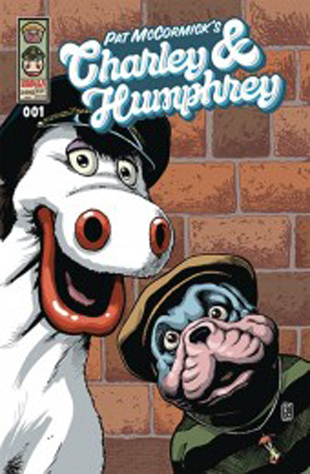
image c. 2022 Acme Ink
The 10 Best Furry Anime You Need To Watch Now
The 10 Best Furry Anime You Need To Watch Now
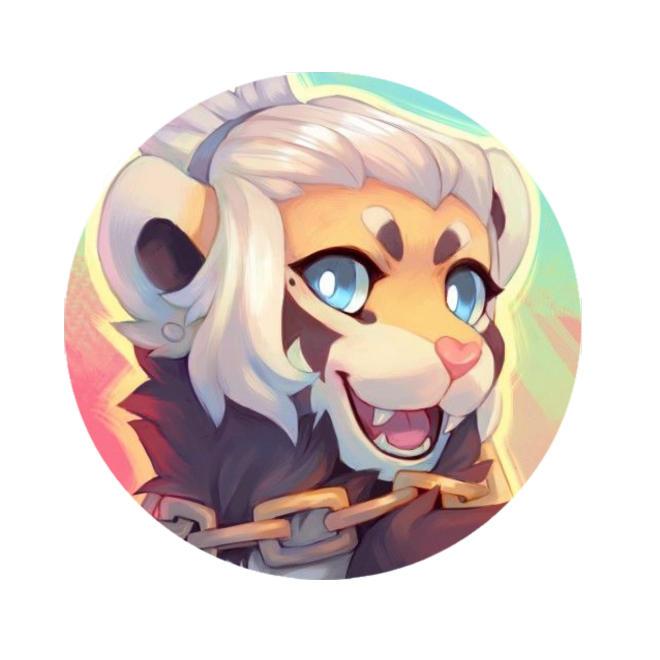 Xege Kheiru, Writer, Furry
Xege Kheiru, Writer, Furry
27 June 2022
What Is A Furry Anime?
Just in case you’ve been living under a rock, anime are Japanese animations and in quite a lot of them you can find humanoid / anthropomorphic creatures working alongside the main character. Whether it be to beat some unimaginably powerful force of evil or to find the meaning within, you can find some furry friends along the way in a lot of anime like Pokemon. But we’re not interested in the anime where these animals get sidelined for the main character to steal the limelight, furry anime are anime where the protagonists are the animals.
Kuma Miko is a 2016 comedy that tells the story of Machi Amayadori, a 14 year old girl who has spent her entire life living in the mountains with her guardian Natsu, a talking bear. Natsu is, as you could imagine, opposed to leaving their home but, getting sick of life in the mountains she believes she is ready to pursue a life in the big city and attend a high school. Is she ready for the urban lifestyle? What does Natsu even know about high school after spending so many years in the mountains?
You can watch this show on Funimation or, like a lot of the entries on this list, Crunchyroll.
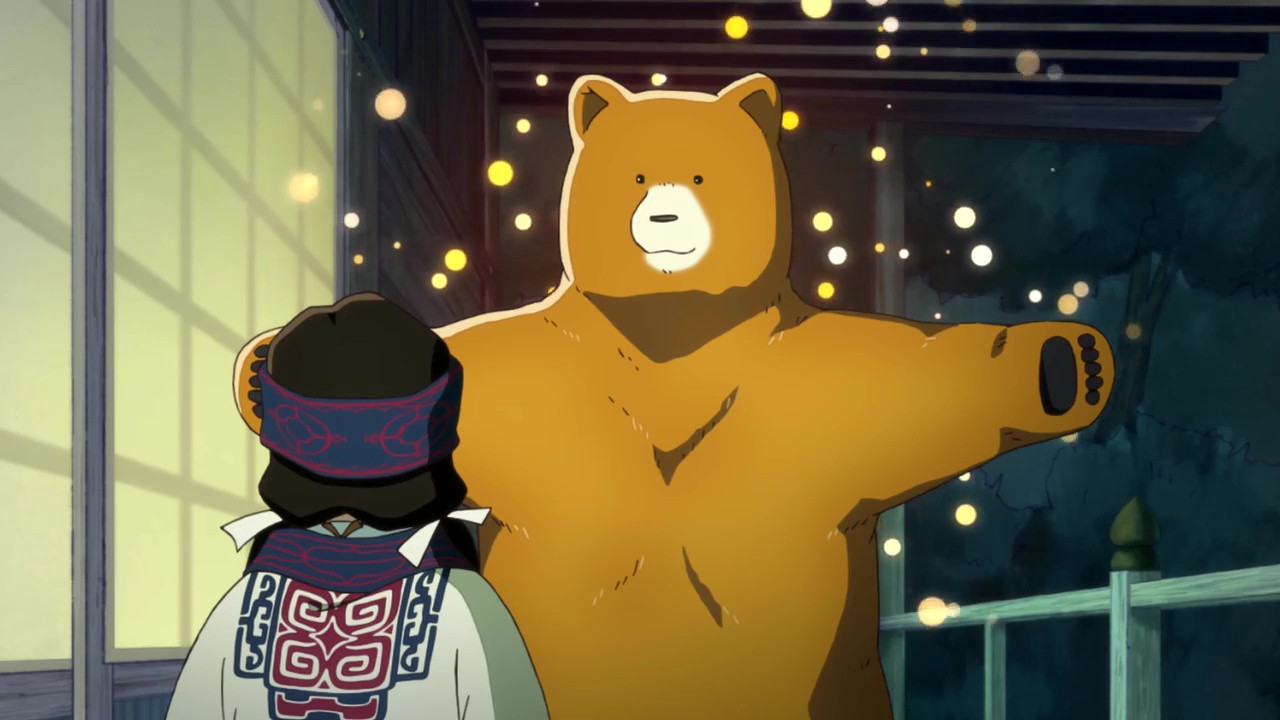
Natsu, The Talking Bear From Kuma Miko
Show Written by Masume Yoshimoto
2. Hyper Police
Hyper Police is a 1997 sci-fi comedy set in the distant future of the Tokyo ward of Shinjuku. It predominantly follows the lives of three characters: Natsuki Sasahara, Sakura Bokuseiinmonzeninari and Batanen Fujioka in a world where humanity is one the brink of extinction, the only thing holding it together being the work of rivaling private police organizations. Natsuki is a half human, half cat (more specifically nekomata) who works for Batanen’s police organization, Batanen is a werewolf and senior officer at said police company and Sakura is a kitsune and partner of Natsuki for some time. Can they stop the relentless crime of Shinjuku?
Unfortunately Hyper Police is not available on Crunchyroll or any major streaming platforms for that matter.
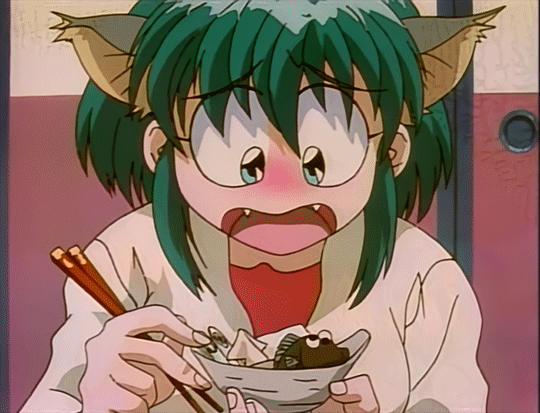
Natsuki Sasahara From Hyper Police
Show Written by Minoru Tachikawa
3. BNA: Brand New Animal
BNA: Brand New Animal is an 80s influenced 2020 action, sci-fi anime beaming with neon lights in its vaporwave aesthetic revolving around a world in which humans coexist with what are known as Beastmen. These Beastmen are discriminated against for a gene called Beast Factor which allows them to transform into animals. The show follows the life of a girl called Michiru Kagemori who suddenly became a tanuki beastman after a blood transfusion, as you do. Following her blood transfusion, her friend Nazuna Hiwatashi is abducted, so naturally, she runs away, seeking refuge in Anima City, a safe haven for beastmen where she meets an employee of the city mayor, Shirou Ogami. Together they investigate what caused Michiru’s random transformation. As their investigation continues, the conspiracy of Anima City thickens, uncovering the darkest secrets of their society.
BNA: Brand New Animal is licensed by and available to watch on Netflix.
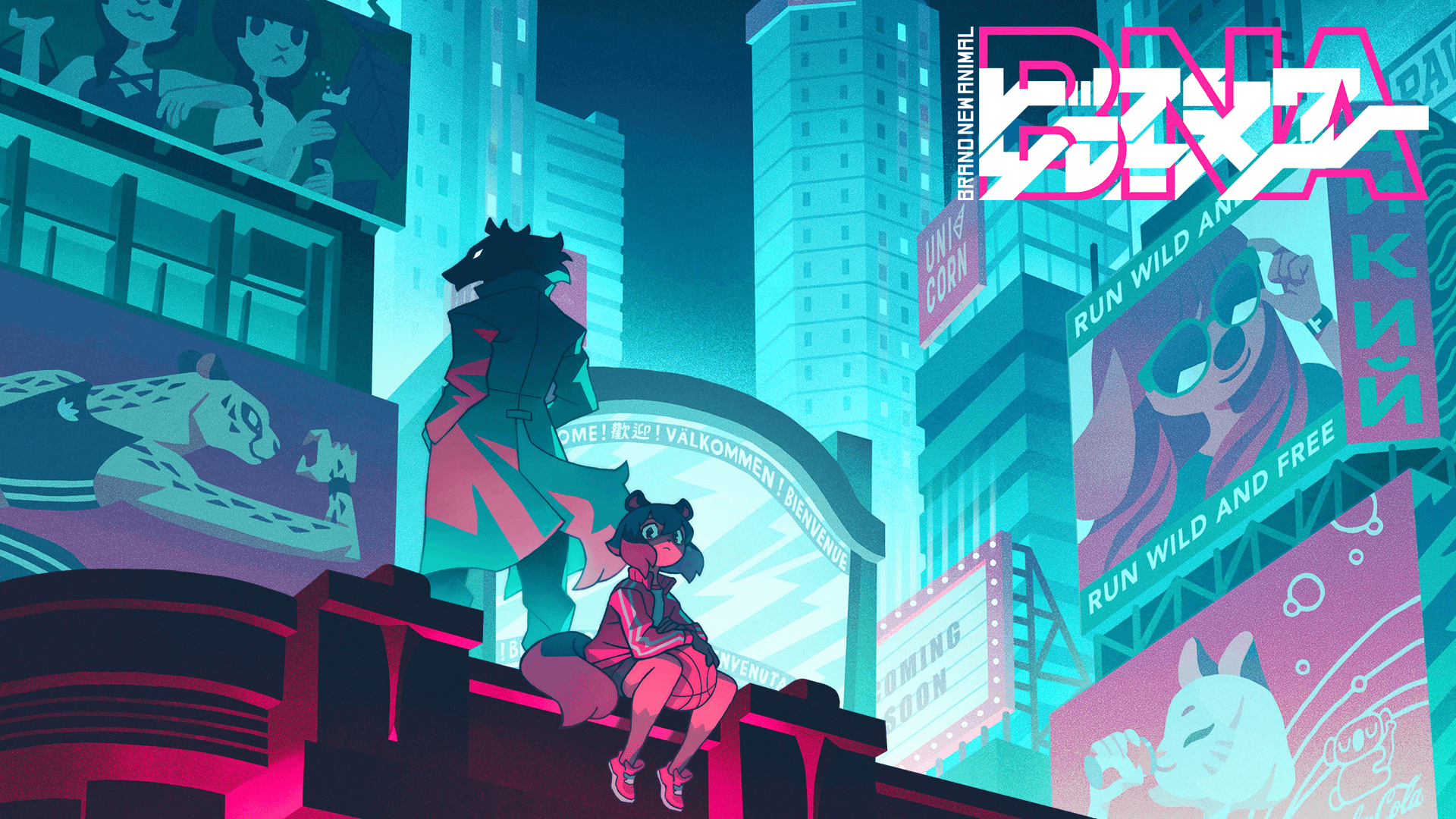
Michiru & Shirou BNA: Brand New Animal
Show Written by Kazuki Nakashima
4. African Salaryman
Also known as African Office Worker, African Salaryman is slapstick comedy following the monotonous 9-5 office life of a lion, a toucan and a lizard as they get caught up in far from normal office life antics. Being animals from the Savannah, you could probably imagine that office life isn’t perfectly suited for them and they make this no secret at all as a lion struggles to commit to his diet, a lizard attempts to learn party tricks to impress his coworkers and a toucan can’t wait for his summer vacation away from the old ball and chain. Everything about this show doesn’t make sense and its perfect like that, because it’s not supposed to.
You can watch African Salaryman on Funimation.
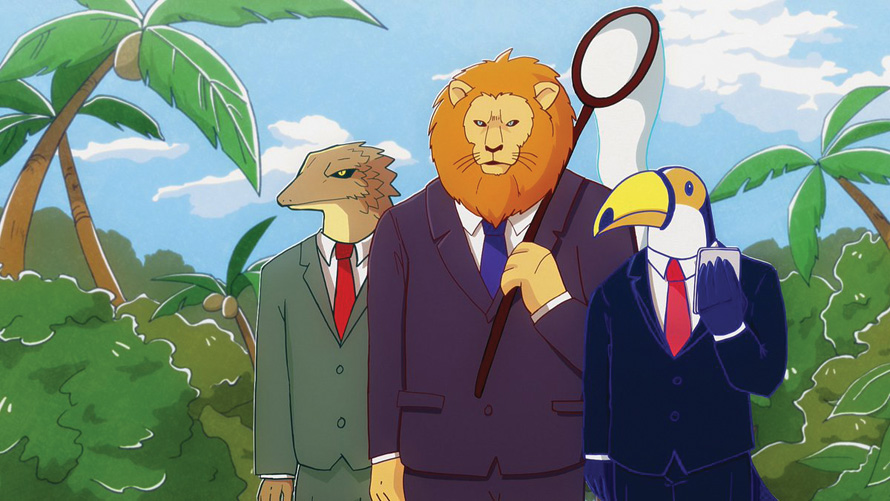
The Lion, The Toucan and The Lizard From African Salaryman
Show Directed by Tetsuya Tatamitani
5. Damekko Dōbutsu
This show is kinda like reverse Zootopia. This 2005 comedy, in its almost chibi art style, tells the story of the “useless” wolf Uruno, who, rather than being unable to repress his savage desires, is actually unable to hunt and kill and is told he does not have any of the traits of a wolf. As a result of his timid behaviour, he’s sent to live in the forest with other equally “useless” animals where he meets Ushara, a loud mouthed and borderline aggressive rabbit. On his travels, Uruno meets several other animals who just do not fit the behaviour that is expected of them, like a clumsy cheetah, a devilish unicorn and a near-sighted eagle. Together they must work to regain their animal instincts and live up to their names.
Damekko Dōbutsu, like Hyper Police, isn’t available on any major streaming platforms.
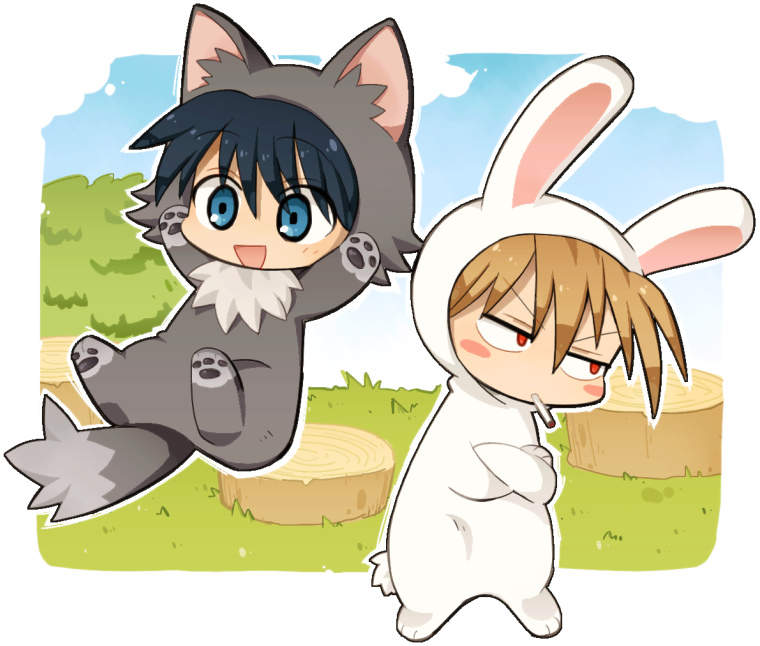
Uruno and Ushara From Damekko Dobutsu
Show Written by Noriko Kuwata
6. Gleipnir
Gleipnir is a 2015 action, horror anime that slightly blurs the line between furry anime and just any other anime. It tells the story of high school student Shuichi Kagaya who gains the ability to transform into a giant dog. This doesn’t just look like a normal dog though, it looks more like a massive dog fursuit with a zipper and a comically large smile stuck on its face. Shuichi finds a girl in his class, Claire Aoki, whose sister was responsible for killing her parents and as you could probably guess, it’s Shuichi’s duty to correct this injustice with his new-found powers.
Gleipnir is available to stream on Netflix, Crunchyroll, Funimation, Prime Video and Apple TV. pretty much as long as you have some sort of streaming service you can watch it.
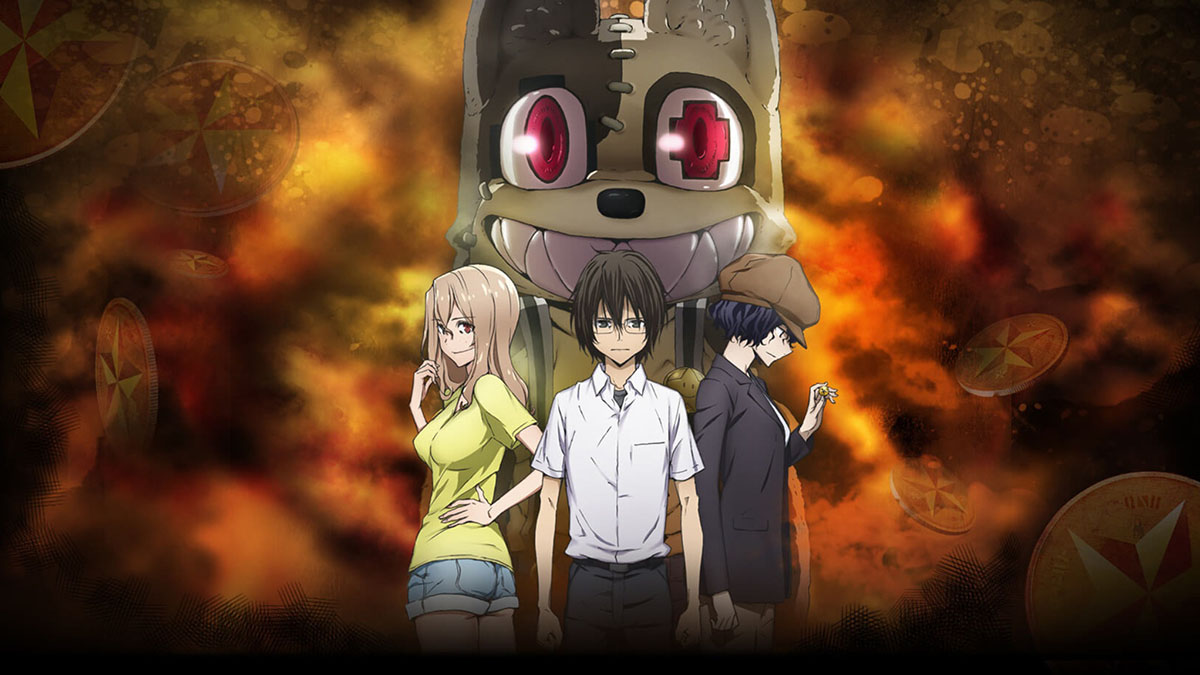
Suichi Kagaya From Gleipnir
Show Written by Sun Takeda
7. Spice and Wolf
Spice and Wolf is a 2008 romance, adventure anime, set in the medieval fantasy world of… I’m not really sure they never specify where they are. All you need to know is, this place is reminiscent of Runescape. Anyway, it’s a story about Kraft Lawrence, a traveling merchant who, upon his travels, meets Holo, a legendary wolf deity. They join forces and travel this vast and expansive world, going from town to town to do both business and solve the problems the locals are facing. This show is driven more by its characters and dialogue than its plot. Just watching the two wander from place to place, conversing oblivious to how ridiculous their circumstances are makes for a great watch.
Spice and Wolf is available to watch on Funimation, Netflix and Crunchyroll.
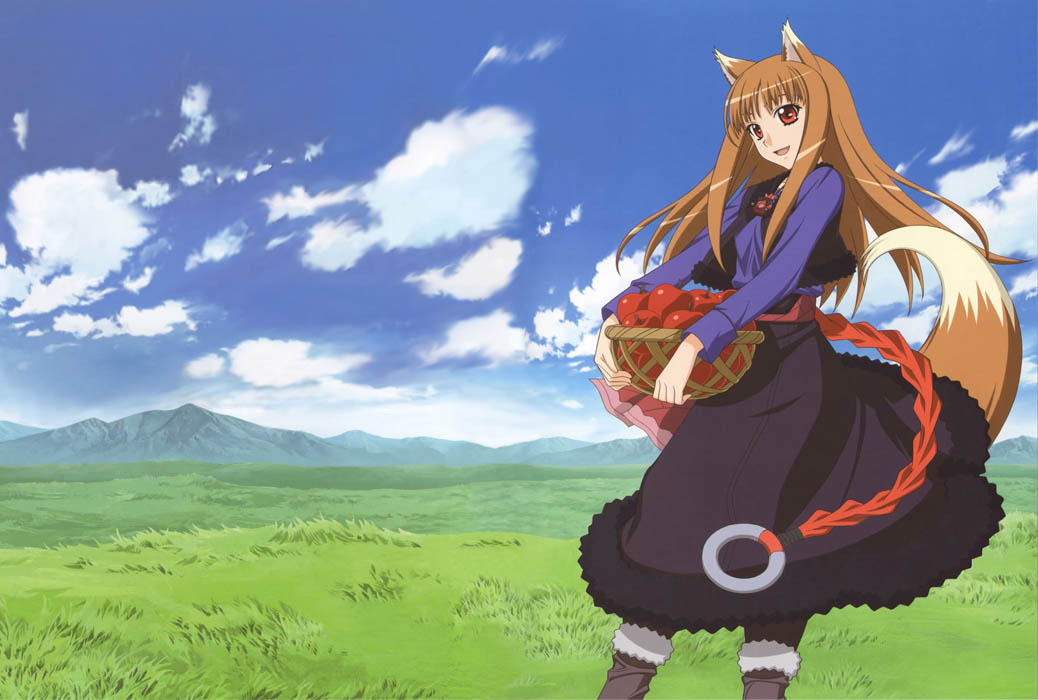
Holo From Spice & Wolf
Show Written by Isuna Hasekura
8. Inuyasha
It’s hard to pin Inuyasha down to a specific genre, it’s more just a light-hearted easy watch. It’s got action, it’s got romance, it’s got comedy, it’s got adventure, it’s a bit of a jack of all trades. It is a 2000 furry anime set in modern day Tokyo, following the life of Kagome Higurashi, a teenage girl. This is where things get a little crazy. On her 15th birthday, Kagome is dragged into an “enshrined Bone Eater’s well” by a centipede demon whilst looking for her cat. Still following? Okay, good. Instead of hitting the bottom of the well, Kagome is transported to a parallel universe in 16th century Japan. In this universe the centipede demon that dragged her into this place was killed 50 years ago by a warrior priestess Kikyo who she seems to be the reincarnation of. She joins forces with a fox demon, Shippo and several other characters to collect fragments of a jewel scattered across Japan.
So, if you’re at all interested in finding out more about what the hell is even being described, it is available to stream on Hulu.
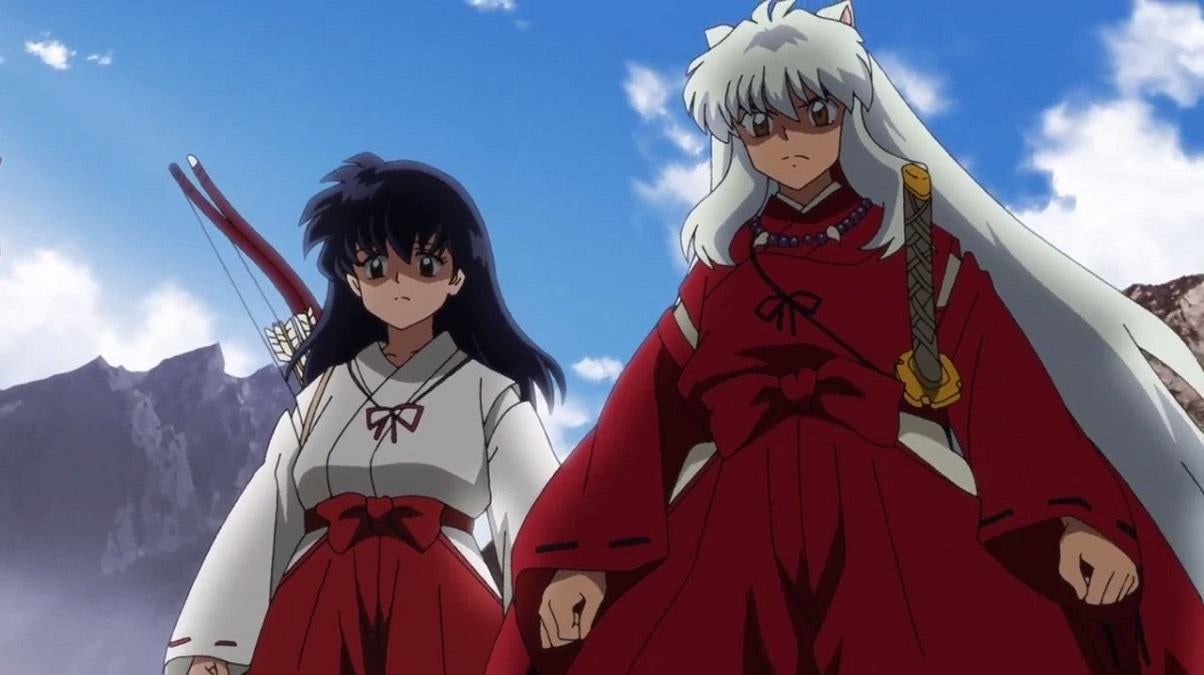
Kagome & Shippo From Inuyasha
Show Written by Rumiko Takahashi
9. Shirokuma Café
Shirokuma Café, directly translating to “White Bear” Café, is a cute 2012 slice of life anime that revolves around a cafe that is literally run by a polar bear. When the local animals finish their shifts at the zoo, they come down to Shiroku Café to unwind (as well as a few humans sometimes). These animals include a panda, a penguin, a llama, a grizzly bear and so many more animals. As for the plot, it kinda just follows the daily lives of these animals and the antics they get up to, yet it manages to remain entertaining through pure charm through its hilarious dialogue and beautiful animation. Just watching the animals interact on a daily basis is enough to make for a great show.
Shirokuma Café is available to watch on Crunchyroll under the name “Polar Bear Café”
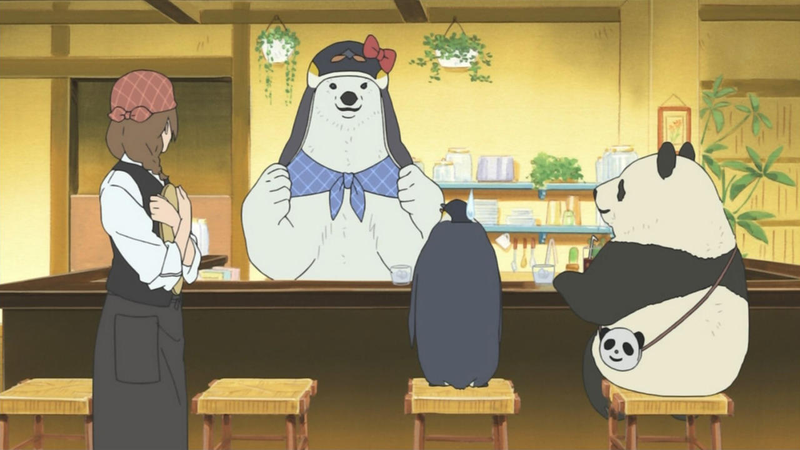
Shirokuma Cafe
Show Written by Aloha Higa
10. Beastars
If you’re at all into furry anime, then you might’ve seen this one coming, but the hype surrounding this Netflix original is just undeniable. With an over 94% rating on Rotten Tomatoes, Beastars is a 2019 coming-of-age drama that tells the story of a world completely populated by anthropomorphic animals, however, a cultural tension lies between the herbivores and carnivores. The show mostly follows the life of Legoshi, a large but timid gray wolf who attends Cherryton Academy. Herbivores and carnivores alike can attend this school but there is a clear divide. However, tensions drastically rise after the brutal and mysterious murder of Alpaca, Tem. In searching for answers, Legoshi uncovers the turmoil of the herbivores and carnivores of Cherryton Academy.
Given that it’s a Netflix original, Beastars is only available to watch on Netflix.
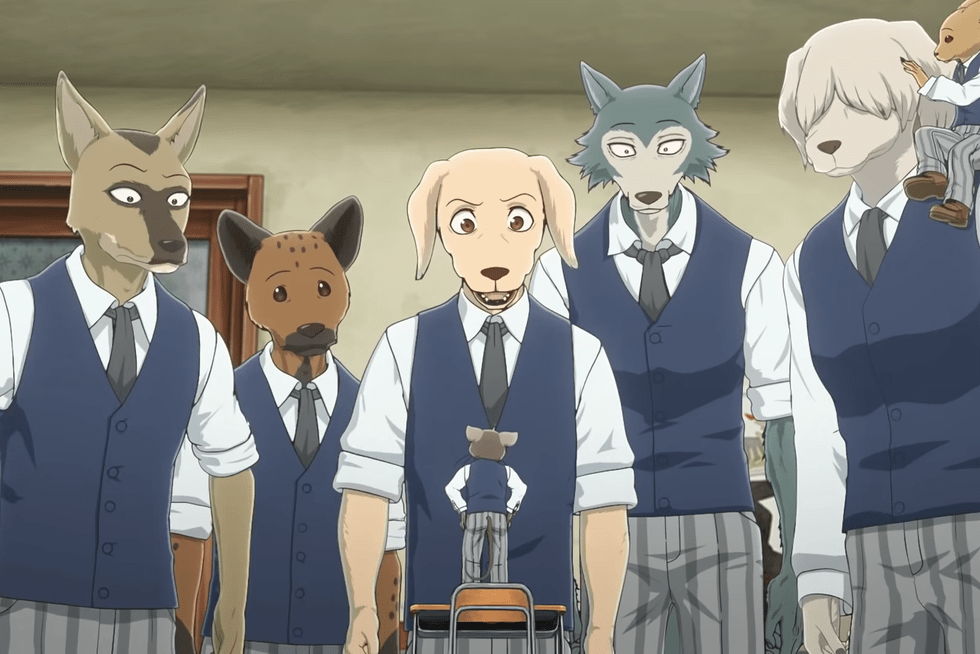
Beastars
Show Written by Paru Itagaki
The post The 10 Best Furry Anime You Need To Watch Now appeared first on Fursonafy.
Closure, New Venue, Attendance numbers - Grovel Reports June 27th 2022

Hi everyone! Welcome to the next broadcast highlighting recent events in the furry community. With my recent visit to Furality Aqua, I recorded my newest broadcast in Luma this time. This world is public in VRChat and can be found if you search for FYNNS room Coastal Furry Events + Keep Tahoe Furry announcement https://twitter.com/Bluehasia/status/1539647115441295360?s=20&t=jtuIO-H8Elsh8abIBESaQQ Bewhiskered https://www.2022.bewhiskeredcon.org/registration SodaCityFurCon https://twitter.com/SodaCityFurCon/status/1536519894488997889?t=UNMkJhSiqasCjNdlvmSMmA&s=19 Fuzznet https://www.fuzznet.world/furrymusicians StratosFur announcement https://twitter.com/StratosFur/status/1537192728479649792?s=20&t=I_59XlqfvxU51fw8w4ATbg Furality Showcase https://www.youtube.com/watch?v=3ZyXtt7S6G8 Wikifur attendance https://en.wikifur.com/wiki/List_of_conventions_by_attendance If you like the work I do please like/follow/share to support the channel I'm on multiple platforms https://twitter.com/GrovelHusky https://www.twitch.tv/grovelhusky https://t.me/grovelreports Subscribe to show support https://www.youtube.com/c/GrovelHusky/?sub_confirmation=1 Grovel Reports Studio made by Kydek https://twitter.com/FluffyKydek Banners used in the channel were made by Slushi https://twitter.com/Slushi3Brushi3?s=09 Music created for Grovel Husky by Whooshagg https://whooshagg.com/ Closure, New Venue, Attendance numbers - Grovel Reports June 27th 2022 #furality #furry #furryfandom
第十二屆放視大賞 部分作品融合獸文化吸引目光
第十二屆「放視大賞」5/18至20在高雄展覽館舉行。本次共有79校、151系,多達3322件作品參賽,爭取平面、動畫、遊戲等各類組大獎,配合展覽、國際論壇、交流聚會、技術發表等活動,打造國內最佳的產學交流平台。
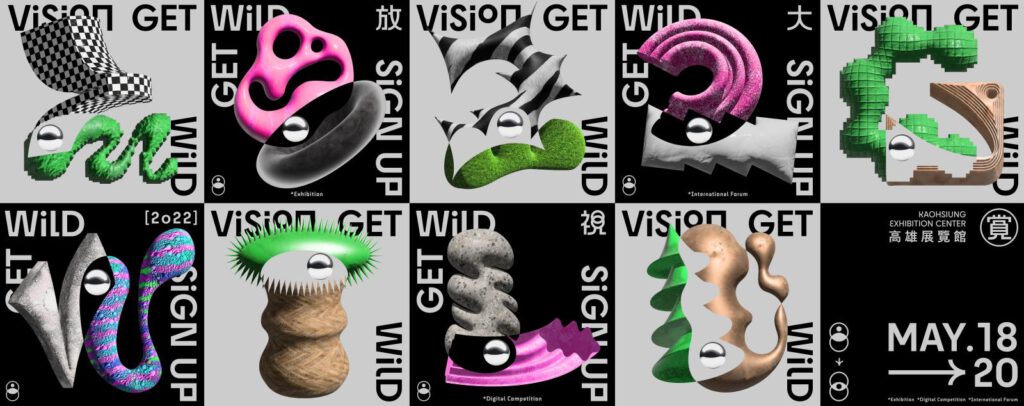
第十二屆放視大賞宣傳圖。圖/放視大賞官網
「放視大賞」由經濟部工業局與臺灣產學策進會共同主辦,為國內最具指標的學生創意競賽展覽,涵蓋了影音、動畫、遊戲、平面等領域。而本次展出的作品中,也不乏許多與獸文化相關的遊戲與動畫作品。雲林科技大學數位媒體設計系「Oz 製作委員會」,在《Oz:永恆搖籃計劃》視覺小說遊戲裡加入一位獸人角色;崑山科技大學第 111 級視覺傳達設計系創作的《撲通撲通我和你 DokiDoki》,則是一部獸人為主角的動畫,講述了一段 「不健康暈船關係」的愛情故事;臺北科技大學互動設計系製作的《基音實驗室》則是一款以獸人角色為主,包含了角色養成與視覺小說的音樂遊戲。不論是哪款作品,都吸引了不少獸迷們的目光。
《Oz:永恆搖籃計劃》 是一款結合了彈幕射擊元素的視覺小說遊戲,玩家將在遊戲中扮演身為時空管理局稽查員的女主角「赫拉」,與近距離作戰單位「白銀」、遠程支援單位「香草」組成「OZ 小隊」,一同前往未知的次元宇宙「童話仙境世界」中進行調查,找出創造這個次元宇宙的幕後黑手,並了解事件背後的成因。當中在 OZ 小隊裡,代號為「白銀」的近距離作戰單位是一位外表近似虎獸人、白底灰條紋的「科達塔」人,出生於西赫特世界的某個部族中。白銀自幼成長於狩獵活動與領地之爭中,在艱困的環境下被訓練成了一名優秀的戰士,也訓練出了他超乎常人的野性、觀察周遭環境的能力與對危險的感知能力。「Oz 製作委員會」提到,之所以會在《Oz》中加入白銀,單純是因為個人的喜好,再加上團隊成員打算將《Oz》的世界打造成一個多種族的世界,便設計出了「白銀」這位非人類的角色。
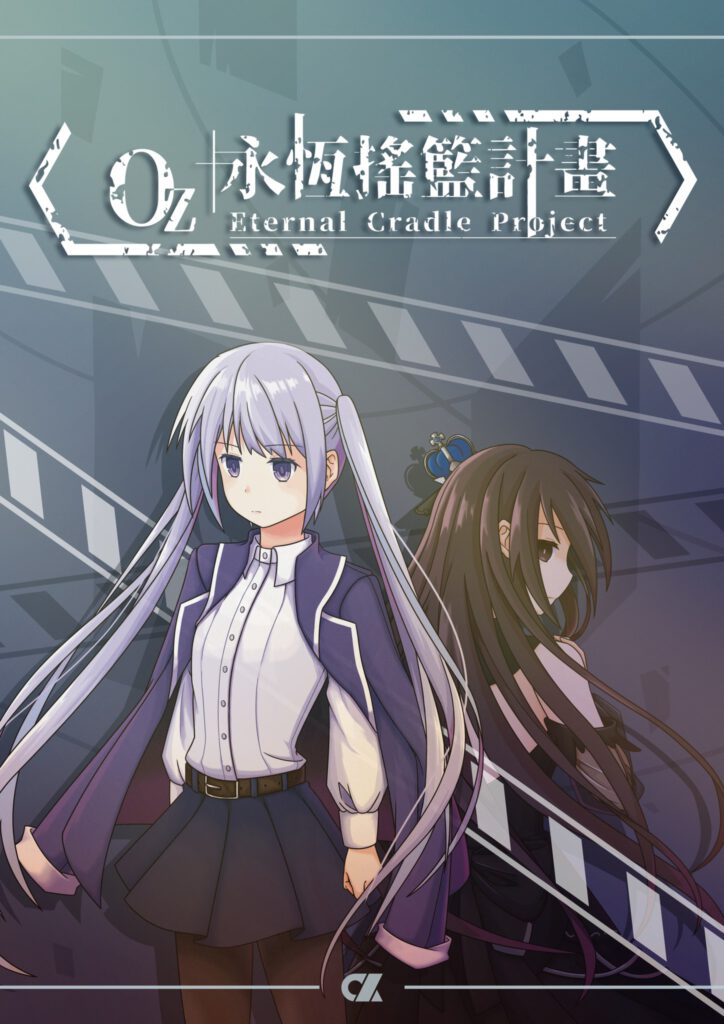
《Oz:永恆搖籃計劃》海報。圖/《Oz:永恆搖籃計劃》Facebook 粉絲專頁
《撲通撲通我和你 DokiDoki》則是一部以「不健康的暈船關係」為主軸的獸人短篇動畫,故事的女主角Dona是一位癡情、愛幻想、多愁善感且內心充滿「小劇場」的狗獸人,而男主角Kima則是一位狡猾、狂野且內心暴戾的狐狸獸人。故事的一開始,Dona 從房間中醒來,牆上貼滿了 Kima 的照片,而準備出門的 Dona 還不忘在出門前親了一下 Kima 的照片,表達對於男主角的愛慕之情。鏡頭接著來到了公車站,Dona一上車便巧遇了自己愛慕已久的 Kima,內心瞬間出現許多小劇場,無論是幫 Kima 綁鞋帶、不小心碰到 Kima 的手或是坐 在 Kima 身旁,都讓 Dona 幻想出了無數的小劇場。隨著故事接近尾聲, Kima 的狂野形象卻隨著他廝殺車上乘客的畫面慢慢的表現了出來。即便如此, Dona 卻仍對 Kima 的所作所為視而不見,仍然愛慕著 Kima,卻不知 Kima 已逐魔爪伸向了自己。作者希望透過男女主角間的反差,傳達一種「暈船者經常會對對方的缺點視而不見,最終連帶使自己也遭到這種價值觀反噬」的觀點。無論是 Dona、 Kima 或是乘客所扮演的角色與他們所展現出的行為都可以被以各種角度解釋, 被 Kima 殺害的乘客可以代表曾經受 Kima 所害的人,而見證 Kima 傷害他人後仍選擇相信他的 Dona,則讓觀眾反思了現實生活中是否也有類似的案例。
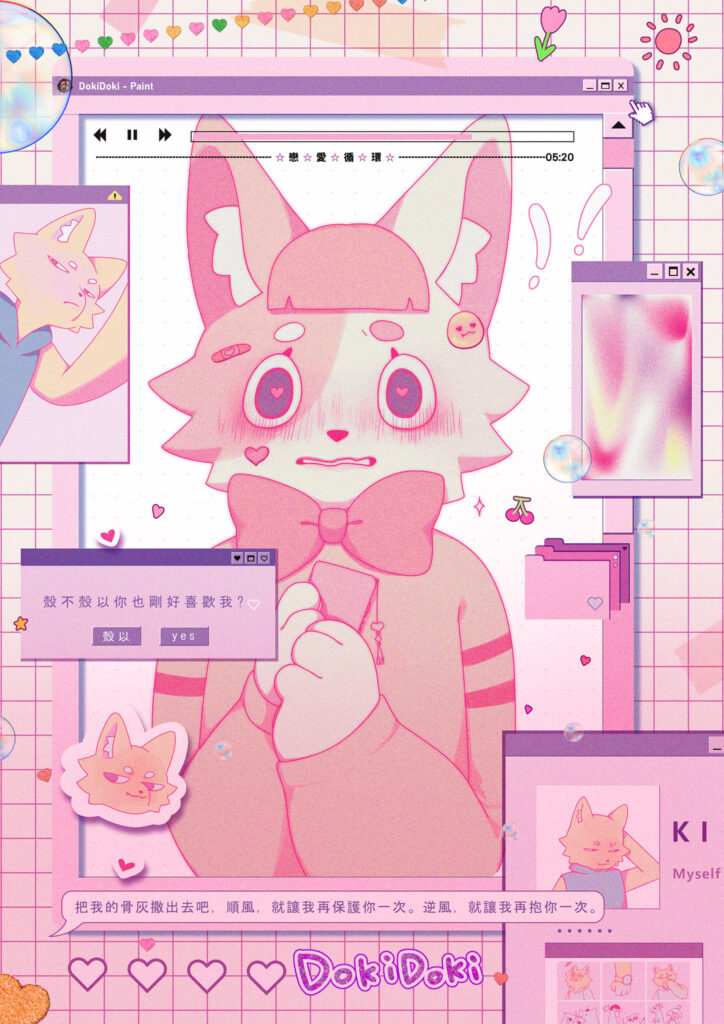
《撲通撲通我和你 DokiDoki》海報。圖/《Doki Doki》官方 Instagram @dona_dokidoki
《基因實驗室》是一款結合了角色養成、視覺小說的安卓平台手機音樂遊戲,玩家將扮演實驗室內的研究員,透過基音序列儀分析樣本得到關鍵資訊來研發科技、培養角色與觸發新事件,經營科學實驗室。遊戲目前仍處於開發階段,更多詳細的資訊有待製作團隊公布。
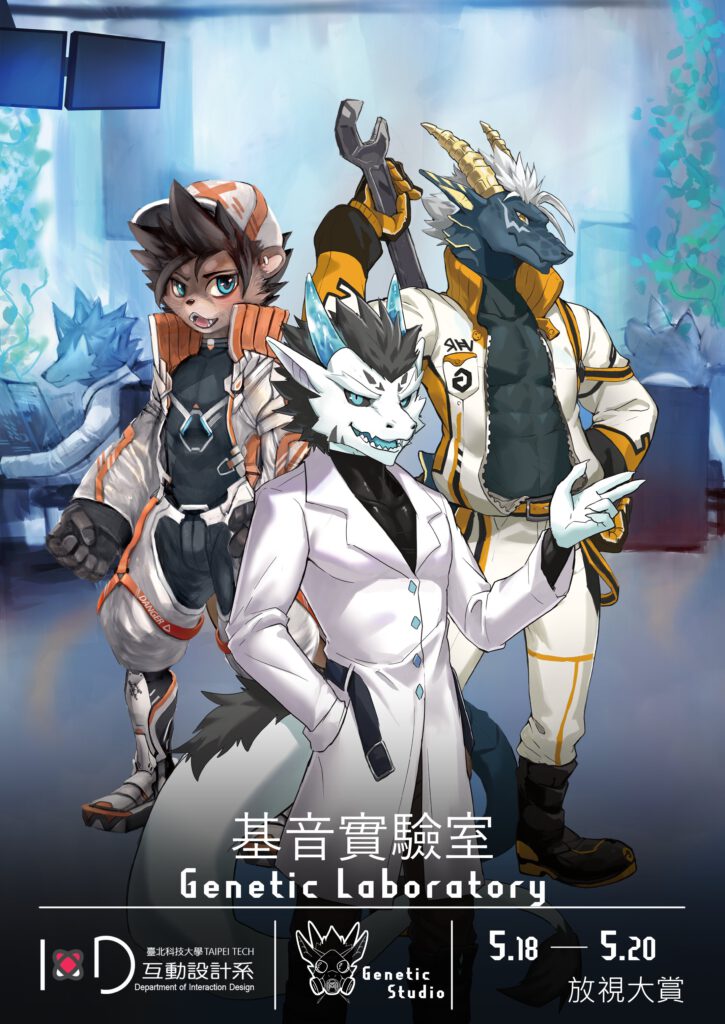
《基因實驗室》海報。圖/《基因實驗室》Facebook 粉絲專頁
本屆放視大賞與先前幾屆一樣令人驚豔,所有參展團隊紛紛拿出自己的心血結晶展示給觀眾,展現自己的創意與執行能力。無論是出於製作團隊的個人喜好或是因應人物設計而選擇加入獸人角色,都顯示了獸文化逐漸被創作者們所接受。在獸文化蓬勃發展下,想必未來能見到更多創作者在作品中融入獸文化,創作出更多相關作品。
Paw the Left Button Twice
Apparently this is a thing we missed — but now it’s available over here. Cat + Gamer is a black & white manga written and illustrated by Wataru Nadatani, now translated and distributed by Dark Horse. “Riko’s coworkers can’t quite figure her out — she never talks about her personal life, she never works overtime, and she never joins them for happy hour. Is she antisocial? Nope, she’s rushing home to play video games! One day, a stray cat is found in the office parking lot, and before Riko knows it, the cat has moved in with her! Having no experience with pets, Riko uses lessons drawn from video games to guide her in cat care, while her cute companion tries to understand her behavior through a cat’s worldview.”
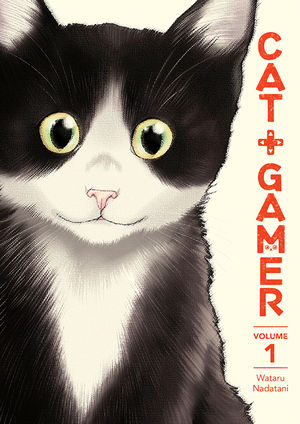
image c. 2022 Dark Horse Press
Bearly Furcasting S3E9 - Riddles, Media, Math
MOOBARKFLUFF! Click here to send us a comment or message about the show!
Moobarkfluff! Taebyn and Bearly are back at it again. This week we talk a lot about media, tell some cringy stories, and discuss our weekly watching programs. We wish some furs happy birthday,Taebyn tells us all about his new smart phone, and explains how to duplicate things indefinitely with math! How did that pea get on the sun? Moobarkfluff!
Brode Electrolyte Vitamins; Get 25% off your entire purchase:
Thanks to all our listeners and to our staff: Bearly Normal, Rayne Raccoon, Taebyn, Cheetaro, TickTock, and Ziggy the Meme Weasel.
You can send us a message on Telegram at BFFT Chat, or via email at: bearlyfurcasting@gmail.com
Furries return to the 2022 San Francisco Pride parade
Coming Sunday June 26, 2022

The SF Bay Area has the world’s most dense population of furries, but back in 2012, SF Pride didn’t have activities for the love of anthropomorphic animals. They had a parade contingent in 2002-2005, but it needed help to start again. (See a 2002 video or the Pride tag for more history.)
Whose job is it to make it happen? Everyone’s. In 2012-2019 I was one of the organizers for award-winning floats in the parade, with hundreds of supporters and members. In 2019 (the second year to get an award) we won “Absolutely Outrageous” out of more than 200 parade contingents. The parade was interrupted by the Covid-19 pandemic, but finally, it’s here again.
The Nor Cal Furries are going this weekend with a new trailer, built by @Zoren and @MrDisk0Dog and funded by community donations and volunteers to give everyone an experience to remember. (Funds still accepted, anything extra will pay forward.) Here’s how great it was in 2019:
View this post on InstagramA post shared by Alexa (@alexadotphoto)
We're going to march again in the SF pride 2022 parade!!
Funding is now live for the NorCal Furries 2022 SF Pride contingent.. https://t.co/7FdpF0Hqev
— Zoren Manray (@Zoren) May 8, 2022
PARADE INFO FOR THE FURRY CONTINGENT:For Sunday, June 26 the parade is on Market Street from Embarcadero to the Celebration area at Civic Center. General info is at SFpride.org. Spectators will be watching on Market Street from 10:30 a.m. until late afternoon. ABC7 will be broadcasting the parade to watch from home.
- Our Telegram info channel: Announcements only, no chat.
- Our Telegram chat group: The live connection to everyone.
- If you haven’t signed up to march, RSVP for standby and come anyway. If it hasn’t hit 100 people, more can march, but extras may be turned away over 100.
TRAVEL TO ASSEMBLY: See this map for the parade route.
- By car: No cars or dropoff at the assembly. Try the parking garage on 833 Mission St (middle of parade route, 15 minutes walk from each end) or 33 Mission St (near parade end at 8th and Mission.) Or park farther away and take rideshare as close as it gets. Beware of traffic for a huge event, earlier is better.
- BART riders, go to Embarcadero. The south central exit is closest to the assembly.
- Officially we are signed up as Bay Area Furries, in assembly location #124.
ASSEMBLE NO LATER THAN 12 PM: East side of Main Between Mission and Howard. (At the Rainbow paw on the map, near 111 Main.)
- Arrive to assembly by NOON. Allow time for costume change. (Float setup starts as early as 9 AM so we will be there).
- As with prior years, there could be hours to wait before Step-off. If you bring cooling packs to survive in fursuit they may not last.
- Be patient, bring snacks, but don’t be late or delay others. If there’s a signal to go, anyone who isn’t ready will be left behind!
- The trailer may fit 30 people and those with mobility issues have priority.
- If you walk, it’s a hot, high energy event. Water will be available but hydrate yourself too.
- At end of the parade near 8th and Mission, be ready for the float to sweep people and gear off and leave right away.
- From the dropoff, walk or consider pooling together for self-serve transport.
FURSUITER BASICS — No hard bins. No lounge.
- SOFT FOLDING BAGS ONLY. 100 people have to share the back of 1 car for storage. Minimize gear for a moving event.
- Don’t need change space? Change at your car before coming, or change on the street. We do it every year.
- Want change space? Start and end at Relay’s.
DINNER, and OPTIONAL BEFORE/AFTER FURSUIT CHANGING — Dinner is at 6:00 pm at Relay’s Den. Address by request.
- Notify @RelayRaccoon if you will come. Remember, street parking will be scarce.
- 8:00 am: Relay’s Den will open for fursuit changing. A continental breakfast will be provided (coffee, juice, bagels, bananas, etc.).
- 11:00 am: Relay’s Den will close and we will head to the assembly. Make your own arrangements to get to the assembly. Try MUNI (Church & 16th station is 2 blocks away; Church & Market station is 4 blocks away), BART (16th & Mission station is 4 blocks away) or LYFT/UBER.
- 4:00-5:00pm: After the parade, return promptly to change out of suit. Here’s a map with transit options to get there from the parade dropoff.
- 6:00pm: Dinner is 21+ and here’s the menu.
- To spend the night on Saturday, there’s limited crash space with priority for those from outside the bay area. (Ask @RelayRaccoon).
SAFETY AND MORE
- Big crowds always have potential risk… read this safety page!
- Parade attire: Members have family who want to watch on TV from home. If your costume may make TV cameras skip the group, please contact an organizer for case-by-case arrangements.
- The float won’t stop. It’s a mile and about an hour to march. Keep up the pace, avoid the wheels, and listen to the monitors.
- Contingent Monitors are VERY IMPORTANT to march. Please follow them and be on the job if you are one.
- Marchers, watch where the float is. Try not to bunch up, leave gaps or get too far away. The front-facing banner is where the crowds first see us, but going up to the street side barriers is good too. Use the whole street between the float and crowds on BOTH sides. Dance, pose, give hugs and high fives. Look for TV cameras after Fremont Street, a few blocks from the start.
- No glass bottles, no hard bins, and afterwards there’s an 18” x 18” size restriction on bags if you enter the festival at Civic Center.
- Please volunteer to share photos/videos! #Norcalfurries is the hashtag for social media. #Furrypride works too.
NEED HELP ON SITE?
- Organizers will be hard-pressed, so please contact only for emergencies after using the net, the group and other members.
- General organizing: @Zorenmanray and @Patchmutt. Car, float, storage issues: @Mr_Disk0.
SEE YOU THERE! Art for banners by Kado Husky.


Like the article? These take hard work. For more free furry news, follow on Twitter or support not-for-profit Dogpatch Press on Patreon.Want to get involved? Try these subreddits: r/furrydiscuss for news or r/waginheaven for the best of the community. Or send guest writing here. (Content Policy.)
And He Sings, Too
You may have heard about the upcoming movie adaptation of Bernard Waber‘s bestselling and beloved book Lyle, Lyle, Crocodile. Well now Sony Pictures has dropped the first teaser trailer for the film, directed by Josh Gordon and Will Speck (both of whom recently worked on Hit Monkey). Turns out that star Javier Bardem does not voice Lyle, the crocodile from New York — that honor goes to singer Shawn Mendes. Bardem instead plays the impresario who is trying to make Lyle into a star — if the big reptile can avoid New York Animal Control, that is. Lyle, Lyle comes to theaters this October.
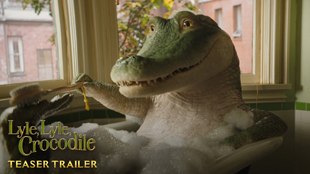
image c. 2022 Sony Pictures
A Chat with Asian Photographers - April Live Stream

A Chat with Asian Photographers - April Live Stream. ---- In this live stream, we invited Tan and Jodern to talk to us about how they became furry photographers, what kind of subjects they shoot, and any differences with photography in furry photography in the East as compared to the West. Enjoy! ---- Social media: Our official Twitter: https://twitter.com/foxandburger Michael: https://twitter.com/foxnakh https://www.youtube.com/channel/UCK9xoFQrxFTNPMjmXfUg2cg Burger: https://twitter.com/L1ghtningRunner Jodern: https://twitter.com/jodern Tan: https://twitter.com/TanWolfXavier
Seal The Connection
Some time ago, writer and illustrator Molly Knox Ostertag gave us The Witch Boy, a coming-of-age graphic novel about a young werewolf boy with… different preferences. We’ll tell you all about that one soon. Right now we want to point you at her latest comic work, The Girl From The Sea. “This sweet graphic novel follows Morgan, a 15-year-old girl living on a small island in Canada, who one day meets a mysterious selkie named Keltie. At first, Morgan is annoyed by Keltie, but as they spend more time together, she realizes her feelings may be stronger than she anticipated.” It’s available now in paperback from Scholastic.
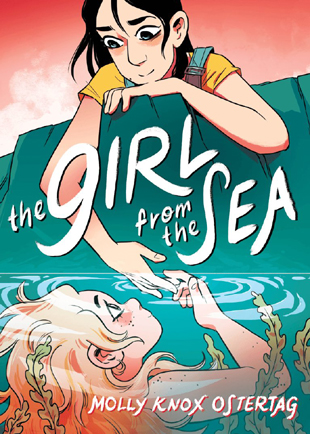
image c. 2022 Scholastic
Episode 520 - Maximum Suck
We recorded this on Friday, June 17th, else this episode would be a lot different given the last weekend of Discourse.
This episode- Adam survived, Star Trek and Star Wars were always political, crypto has a bad week, Musky is getting sued for a lot, waist high house vacuums, and Anthrocon is very soon. Aaaah!
LINKS
Southpaws is creating and promoting The Queer Agenda | Patreon
Telegram Chat- https://t.me/+6pbv_U1AY95jOWU5
Episode 520 - Maximum SuckRhythm Bastard and his music: Support your local swole punk rock furry!

What is Rhythm Bastard? Hardcore Nerdcore Punk Rock. Alternative Laptop Punk. A DIY one-man-band with a furry Florida Man.
“Rhythm Bastard takes the stage armed only with his voice, his guitar and his bandmate, a laptop, playing a mix of punk and garage rock, with music inspired by every thing from video games, anime, comics and everything in between.” – Bio
His newest music is coming on July 1, so let’s hear about it from the Bastard.

(Dogpatch Press): You’re a hardcore nerdcore punk rocker with 10 years of making albums and playing nerd cons. What’s this collection you have coming out?
“Hardcore Nerdcore Punk Rock” is a Road Mix where I redid a lot of the songs I play live, but haven’t been on a proper physical album. Also in 10 years of writing and making music, I’ve learned a lot of new things and made a lot of tracks I’m proud of, so this is a way to look back on everything and go “damn, I’m kind of good at this”.
You’re swole, made your own fursuit, do a podcast about gaming, and could probably wrestle a bear. What talent don’t you have?
I DON’T have the talent to do it all on my own.
A lot of what I’ve done comes from reaching out to other people and always being ready to learn. Like when I was making my Thrash fursuit, I was always engaging with the Telegram groups for questions and feedback, and it’s a project I learned a lot from. When it comes to music, I’m ALWAYS bothering friends and family for feedback regardless of musical knowledge, since I just want to know how the song hits. Even though it might feel cut-throat and ultra competitive, there’s no downside to someone else learning what you know.
Other stuff I’m learning because I’m eager to do it? Writing a visual novel, learning Wwise, and making a VRChat avatar.
Are you really a bastard, and why or why not? What’s the story behind the music?
Depends on your definition ;). So the name “Rhythm Bastard” came from a blog I ran when I was first learning guitar, where I’d learn all the songs from the video game Rock Band, Initially, it was called “The Rock Band Experiment ”, shortened to RBExperiemnt. However, as I got into it, I realized I wanted to do MORE with music, so I decided to scrap the original concept and keep working on playing and learning. However, I wanted to keep the RB initials, so the R stood for Rhythm, because I like playing Rhythm Games, and the B became Bastard, because at that time I was really getting into the comic series Transmetropolitian. The main character, a Hunter S. Thompson expy named Spider Jerusalem uses the word Bastard a lot, so I always have this rebellious connotation toward the word. Anytime I bring up changing it to make it more “PG” or at least Ad friendly, people tell me “NO, IT’S PERFECT”
Thrash the Trash Panda is your fursona, when was he born and what’s his story?
The comedy website Something Awful used to have a weekly music column called “Your Band Sucks”. Occasionally they’d have a Q&A article where readers can send in questions. My predilection for raccoons came from one question where someone asked:
If animals (humans don’t count in this case) could play music, what species do you think would have the most talent and why?
and the answer given by Dr. David Thorpe was:
” I’d give it to Raccoons, because they have all the hallmarks of a great rock band: they come from working-class backgrounds, they’re not afraid to get down and dirty, they have an awesome gimmick (wearing masks), and they’re cute as heck. They’ve also got those little hands, so they could probably play guitars.”
And I felt that described me to a T.
Years later, when Guardians Of The Galaxy Vol. 2 (a movie I have not seen even though I LOVED the first one, and LOVE James Gunn’s work) came out and Peter Quill brought the term Trash Panda into popularity, I leaned into the pun of “Thrash” panda, and the song was born. Eventually I just liked getting art of this character I made up for the song whenever I’d recite the lyrics so much, I made it official.
One fun tidbit I came up with is real name isn’t “Thrash Panda”, but something that’s foreign and hard to pronounce so he was like “Fine, yup, that’s it”.
When I commissioned HELLBREAKFAST to do the cover art for my album Bastardmania, which was the music I did for a video game that ended up being not used, I wanted the cover to resemble that of the game WWF No Mercy for the Nintendo 64. Obviously I’d be The Rock in center, but for the people on sides, I figured I’d do cameos from my musical ouvre. On the left is “Jonesy Spencerson”, a Radio Announcer character who did the interludes on my album Status Quo Radio, and on the right is Thrash. I loved the outfit so much I thought “YUP, IT’S CANON NOW”
Recently you played Furry Weekend Atlanta, where you had volunteers serve you as human mike stands. Could that be someone’s kink, or were you wholesome and just in a panel room without full amenities while grinding your way to main stage time?
I’m going to go with the former, since that sounds more badass. I tend to bring a lot of equipment whenever I do a show because I never know what a con will and won’t have, and most of the time I get thrown into a panel room instead of a stage, so I have to do whatever I can to make things interesting. I rarely play outside of Florida, where I can bring whatever I need, but when I have to factor in traveling further than a few hours, it gets dicey.
FWA was great, though. The show still ruled. I make things happen.
What kind of amazing show would you do on main stage? Would you include an interlude where you actually wrestle a bear? Should I include a call for furry bear volunteers? Or would you do something else amazing that gets cons to put you on?
To compensate for being on my own, I’ve learned to add more to my solo sets: Before my first song I do a big lipsync introduction to hype the crowd up, I throw Magic The Gathering cards into the audience, and I’m looking into a projector and videos that play during my songs to increase the WOW factor.
Getting a full band would also be a big help for sure. I’ve always been a victim of “Other Band Syndrome”, where I’ll start playing with a couple people and then their OTHER project starts doing well so they have to devote more time to that. But actually having a band with me would give me so much more flexibility and interaction.
As for your suggestion of bear wrestling, I’d be down for booking a Fursuiter Wrestling show at a larger con. That’s just a damn good idea. Neko Chan Punchy/Mr. Cat set the precedent for such a thing, so maybe you can see a Raccoon vs. Cat Grudge Match in the future.
Some highlights from when I fought my arch nemesis @DamonLeigh  Full match at https://t.co/vPgd05yV6n pic.twitter.com/SbhrIxQYj6
Full match at https://t.co/vPgd05yV6n pic.twitter.com/SbhrIxQYj6
— Neko Chan Punchi 
 (Mr. Cat) (@realfozzcat) July 15, 2018
(Mr. Cat) (@realfozzcat) July 15, 2018
You wrote “Furry cons are Ren Faires mixed with Pride Parades.” That’s a cool description, do you want to give any more details?
Why I went with Renaissance Faires in particular, it’s that while there are inroads from corporate pop culture (i.e. Going to a Ren Faire because you like Game Of Thrones, Lord Of The Rings, The Witcher, etc. vs. going to a fur con because of Disney movies, Starfox, etc.), the VAST majority of people who dress up for them are going as their own character that fits the theming. The comparison to Pride Parades is that at Furry Weekend Atlanta, I saw people being themselves at 110% and loved it. While yes, the furry fandom is very heavily LGBTQ+, that comes from the fact that participation in the subculutre ENCOURAGES you to look at yourself in a different light.
What I like about the furry fandom is that it’s not around something specific, but rather a general concept, like being a fan of Fantasy or Sci-Fi, so it’s creator owned, and there’s no REQUIREMENTS. I play a lot of anime conventions in Florida and people tend to lose interest since while I’m playing songs inspired by video games and comics, something the con goers enjoy as well, they bail when they realize I’m not doing VGM covers or rapping over anime beats. Furries have been more keen to take a chance on me and my music, so that’s why I’ve been leaning more toward my furry side.
Have you encountered haters making bad decisions to mess with you and the fandom? I didn’t get the idea that most of your music is provocative, but I saw you did a Fuck TERFs song.
“Fuck TERFs” came out when SonicFox got temporarily suspended from Twitter for saying “Fuck TERFs”. A LOT of people get banned for sticking up for themselves, so I wanted to make a song where everyone can shout it out without having to worry about a Websites protecting Transphobes feelings. The only pushback I’ve gotten from it is online, and a lot of TERF hate directed at a 6’1″ attractive swole Cis Man sticking up for Transgender people comes off as really pathetic insults, like “moid” (the “male” equivalent of “Femoid”, an incel term for women) and “penis haver”.
What made me really happy was when I saw an uptick from people watching the song on YouTube because someone posted it on a transgender-led meme subreddit, and the comments were “This is what I needed, thank you!”. Occasionally I’ll do a twitter search and people quote it!
I also have a song called “Run Over Ronnie”, written shortly after Florida’s Governor Ron DeSantis legalized running over protestors in the wake of the protests from the summer of 2020, and reworked the MC Lars song “Hot Topic Is Not Punk Rock” to “Think Geek Is Not Nerdcore” that focused on the consumerism of the Geek Brand, so I can be provocative when I want to be.
Have any good con stories?
At Anime Iwai 2021 in Fort Lauderdale, I participated in a cosplay runway competition as Meowscles from the game Fortnite, who is a muscular cat man with an otherwise human body. I didn’t win, but I was clearly the fan favorite. What I didn’t expect was someone recorded it, posted it on TikTok over some hella sexy music, and had a bit of a viral moment. I was moving at the time, so it made things a little less hellish seeing all the thirst.


Are you going to Anthrocon and what do you look forward to there?
Anthrocon is VERY up in the air for me right now since I’m waiting to hear back from them. Megaplex is local, and I enjoyed the experience of FWA so much that I’m still open to playing cons all over!
Is there anything else we should cover?
My manager is making me say this; HARDCORE NERDCORE PUNK ROCK COMES OUT JULY 1ST, support your local swole punk rock furry by checking out the linktree and if you want to book me, email info@fireworksfactorymgmt.com!
Also follow here:
Like the article? These take hard work. For more free furry news, follow on Twitter or support not-for-profit Dogpatch Press on Patreon.Want to get involved? Try these subreddits: r/furrydiscuss for news or r/waginheaven for the best of the community. Or send guest writing here. (Content Policy.)
Russian police raid Moscow furry meet – fandom sees rising oppression.
Furries and freedom are the common topic between an incident in America and one in Russia. This builds on previous stories of anti-LGBT harassment and opposing war in furry news on Dogpatch Press.
Let’s start close to home for many readers. Across America, right-wing attacks have been punching through furries to strike LGBT rights. These attacks are based on debunked hoaxes, but in May, one caused real damage in a Wyoming school district. A board member mocked furries and ignored bullied students while the district removed anti-discrimination protection for LGBT people. This shows the rising stakes for anyone included in Pride month, which many furries count as part of their fandom and freedom. These attacks are starting small to aim for a big goal that already exists in Russia.
Across Russia, LGBT people have no protection. Russia’s government treats LGBT identity as a political stance for just… existing. Meanwhile, they’re threatened and forced to hide. But Russians can’t easily protest for rights without punishment. It’s also dangerous to show anti-war beliefs, especially if a group is already disfavored. Their free speech is oppressed as anti-government.
Under these conditions, police raided a furry meet in Moscow. It was first reported by OVD Info, a human rights org that monitors political persecution in Russia:
Numerous furries were detained by police in Moscow after one was seen with anti-war pamphlets and protest ribbons. https://t.co/ULVoKqZvUH pic.twitter.com/pOotb30Ysm
— Dogpatch Press (@DogpatchPress) June 9, 2022

PolarLight Wolf
The local view
The Moscow meet was an ordinary fursuit walk that has been covered on Dogpatch Press from close contact with organizers. It’s a social event in public places that follows Russian law in staying apolitical, not even displaying identity. There have been attempts to frame such gatherings. At one, a provocateur tried to jump in photos with a pup mask to get them in trouble. And an anime fan gathering was framed by someone giving them rainbow flags for photos that led to arrests. Those incidents presage this one.
At this walk, police picked people for searches and claimed to find antiwar items in someone’s bag, causing them to detain a lot of members.
More info was submitted that day by PolarLight Wolf, a Russian fursuit maker who gathered it to pass on:
“I would like to share commentary on today’s events.
Talvi Ferret helped to coordinate legal assistance for today’s detainees. Here is what he says in short:
“In Moscow city 11 furries were detained by police today. Some of the detainees were held in a stuffed airless police van for hours. According to the furry event participants words, they were detained for “unusual looks and loud behavior”. They did not confirm misinformation about possible provocation that was spread among the social networks.
A lawyer from the OVDInfo[1] human rights defenders group went to the detainees. I coordinated the actions together with OVDInfo hot line, to not leave anyone in the police station, to help provide legal assistance if needed. This is a standard work practice of human rights defenders during mass detentions – to not leave anyone in the police station. Most of the detainees were released without charge reports, beside the one, minor, who was charged with “discreditation of Russian army”[2], supposedly because of “possessing papers of certain content”. This was not real, and he wasn’t handing out any leaflets – other witnesses among furry meet participants confirm it. A few hours later he was released from the police station.”
Notes:
- OVDInfo is a russian human rights defenders and media activists group. They specialize in providing legal help to people detained or arrested for peaceful protests and other public actions.
- Article 20.3.3 of Russia’s Code of Administrative Offenses, adopted 04/03/22 and appended 22/03/22 introduces punishment for “Public actions aimed at discreditation of Russian armed forces”, states fines from 30,000 to 50,000RUB for persons, and this offense creates res judicata that may lead to charge under eponymous article 280.3 of Criminal Code which states jail up to 3 years.
Proof of location – Talvi’s photo from the police station yard in the Moscow central district where furries were detained:

Talvi Ferret also shared a personal message to the Russian furry fandom:
“My dear furry friends. As the man who was at the police station and coordinated the help for detainees, I would like to ask you all to stop spreading unconfirmed rumors and fake news. In terms of law, of the Constitution of the Russian Federation, international treaties that Russia signed, and you are the citizens of this country, handing out leaflets of certain content (that you are tattling about) is not an offense. Whatever say the “laws” that were adopted by the current regime. Slavery also was legal. German racist and antisemite laws also were legal. In this system you also can become out of law – and we hear and see the examples already. This is the first thing. I ask you to think about it seriously.
The second one. I won’t put it to the public, but it is needed. There wasn’t any distribution of any leaflets. No one endangered anyone. I can’t talk about it in detail – I have no right for it. But according to meet participants and witnesses testimonies that I collected, here’s how the situation looks from this side: Special police forces and/or national guard began detaining people on the street because of their unusual look. Some of the participants had long hair, some had rainbow colored socks. [Bolded by editor]. Just as some of us were dressing like 10 years ago (and I remember it, being a member of the community for a long time), we were noisy and had fun, maybe we were going a bit too far… This attracted the attention of others. But today, in Russia of 2022, generic law enforcement sees this as an offense.
You are accusing the man, who you don’t know anything about, of absolute bullshit (okay, also by the words of others that were nearby, but if you have some confirmed info that contradicts it, you can send it to my PMs). I won’t share further details of the incident. But none of this person’ actions was unlawful. He wasn’t distributing anything, he even did not resist the detention. Please stop all your gossip. You weren’t around. Better to think about it as an important precedent. This is the first incident of this kind to happen. And it will get only worse. Please think about yourselves and those who you care about, and how to be less hostile to each other. Think about the life of furries in other countries, how they walk in capitals of their countries, and also even photographing in fursuits at the main state monuments. And where the police protect them and not pack them into airless police vans.
Remember, in the year 2022, it came for us all. Just as in that famous saying about fascism. They came for us now.
Talvi the ferret
P.S. I tried to change something in this country, and very seriously. I did not succeed. But we’ll be back.”
And the last thing that he consider the most important:
“My very-most-important comment on this situation. My role in today’s events is not so big. I just tried to coordinate the help, to be sure that everyone involved can get the legal assistance. That all of them will be released from the police station.
The main merit is the visit of the lawyer. She found the time to go to the police station, and she helped the detainees. And we’re really thankful to her for this. Most important – is that we have OVDInfo and other human rights organizations. People were on the phone, helping detainees via Telegram chats. They are helping us all. Please pay attention to them. Please give them some words of gratitude.
And yes, OVDInfo always existed thanks to small donations from ordinary people. And I ask you to support them. Your donation will help to fund the legal assistance and lawyer visits, who will help you in cases like that. Your donation will also help to support the project’s IT infrastructure, their operators and technicians, and other specialists. They helped you all.
Please consider sending some small donations to them. Even the price of a cup of coffee. Price of burger. Price of a coke bottle. The flow of these little donations makes the OVDInfo go.
You can support the OVDInfo project by this link – https://donate.ovd.legal/
Tomorrow the regime may come for you too. And you should understand it.
I call for furry solidarity. And take care of yourselves.”
After messages from Polarlight Wolf and Talvi, one of the Moscow furmeet organizers was consulted. The person blamed for bringing anti-war leaflets wasn’t known to anyone in the group. His social media was deleted and it’s unknown if it was a real name, and they’re unable to find a police report in his name. He was called a non-furry provocateur working for the authorities.
Like the article? These take hard work. For more free furry news, follow on Twitter or support not-for-profit Dogpatch Press on Patreon.Want to get involved? Try these subreddits: r/furrydiscuss for news or r/waginheaven for the best of the community. Or send guest writing here. (Content Policy.)
One Little Ape with a Big Responsibility
Recently at the Annecy animation festival, GCI Film gave a first glimpse of their new feature film Ozi: Voice of the Forest, directed by Tim Harper. “The independently financed feature follows the journey of a teenage orangutan, Ozi, and her friends, who set out on a voyage of discovery across the rainforest in a quest to find her parents in a land that has fallen victim to deforestation. Supported by Leonardo DiCaprio’s Appian Way Productions, and Academy Award-winning producer, Mike Medavoy, the feature brings to light critical issues as the world’s rainforests face ever-growing levels of deforestation and its impact on the ecosystems within. The voice cast includes Amandla Stenberg as Ozi, Laura Dern, RuPaul, Donald Sutherland, and Djimon Hounsou. Harper helms the project alongside creators Keith Chapman (Paw Patrol, Bob the Builder) and Rodrigo Blaas (Pixar’s Wall-E, Finding Nemo). Emmy Award-winning Ricky Roxburgh (Tangled, Spy Kids) wrote the original screenplay.” The film is currently in production. Stay tooned.
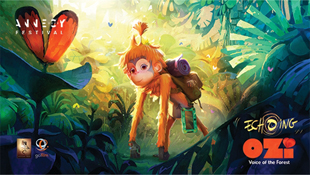
image c. 2022 GCI Film
A Furality Interview With Miru Kitsune About The Fox Portal

Hi everyone! I had the opportunity to speak with Miru Kitsune, Lead Front End Developer Volunteer for Furality about the major changes made to their Fox Portal. https://furality.org/ Miru Kitsune https://twitter.com/miru_kitsune If you like the work I do please like/follow/share to support the channel I'm on multiple platforms https://twitter.com/GrovelHusky https://www.twitch.tv/grovelhusky https://t.me/grovelreports Subscribe to show support https://www.youtube.com/c/GrovelHusky/?sub_confirmation=1 Grovel Reports Studio made by Kydek https://twitter.com/FluffyKydek Banners used in the channel were made by Slushi https://twitter.com/Slushi3Brushi3?s=09 Music created for Grovel Husky by Whooshagg https://whooshagg.com/ A Furality Interview With Miru Kitsune About The Fox Portal #furality #furalityaqua #vr
Prehistoric Pups
Formerly a Wall Street investor, currently a teacher and storyteller, Mystery Mike McHale has created a new illustrated book for kids, Dino Dogz, with the help of artist Mike Goldstein. “The DinoDogz (half Dogz/half Dinosaurs) are on a Mission to rescue five StegoPup eggs that have been stolen by the evil Dr. D. Stroy (their creator) before the doctor uses them to create an army of DinoDogz to take over the world!!!! Along the way, the Dogz must face off against enemies controlled by the doctor to collect their DinoDNA to transform into their true DinoDogz selves.” The official web site includes the on-line Dino Dogz game. Mystery Mike says there’s a mascot costume on the way too!
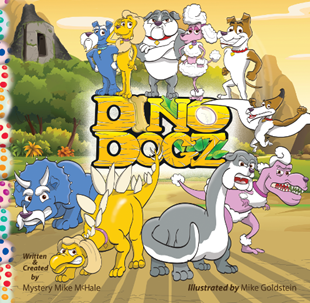
image c. 2022 Mystery Mike’s Funhouse

